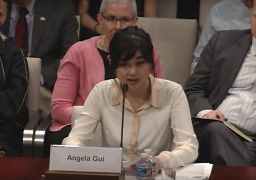Story highlights
Angela Gui says her father, Gui Minhai, was abducted by China
Gui disappeared from his home in Thailand in late 2015
He later reemerged in China to tearfully "confess" to a 2003 crime on state TV
The daughter of a Hong Kong-based bookseller and publisher whose disappearance caused international uproar says her father is being held without trial.
Angela Gui was testifying before the U.S. Congressional-Executive Commission on China on Tuesday, about the alleged abduction of her father Gui Minhai from his home in Thailand.
Gui – a Swedish passport holder – was one of five booksellers who disappeared in late 2015. He reemerged months later in China to make an apparent confession on state television to a 2003 fatal hit and run incident.

“I didn’t hear or see anything of my father until a clearly staged and badly put together confession video of him was aired on Chinese state TV,” Angela Gui said.
“My father, a Swedish citizen who was abducted by Chinese state agents from a third sovereign country, is still in unofficial and illegal detention somewhere in China, without access to consular visits or legal representation.”
Angela Gui urged the U.S. to pressure China for information on her father’s case, and “to make sure that Chinese authorities are not allowed to carry out illegal operations on foreign soil.”
“In the so-called confession my father says he traveled to China voluntarily — but if this is true, then why is there no record of him having left Thailand?” Gui said.
“Only a state agency, acting coercively and against both international and China’s own law could achieve such a disappearance.”
China’s Ministry of Foreign Affairs did not respond to a request to comment on Angela Gui’s allegations, but has previously denied abducting the men.
Disappearing booksellers
The disappearance of the five Hong Kong booksellers sparked mass protests, particularly after allegations that one of them, Lee Bo, was abducted by Chinese police, who are not allowed to operate in the partially self-governing city.
A British passport holder, the UK had said that Lee was “involuntary removed” from Hong Kong and the case was a “serious breach” of a bilateral treaty with China.
Lee later returned to Hong Kong where he told officials he’d been in mainland China to help with an investigation into Gui Minhai.
The other men also appear to be cooperating with Chinese authorities. However, supporters and some family members said the men’s public statements were made under duress.
Beijing maintains that all the men – including Lee and Gui – handed themselves over voluntarily to Chinese authorities.
China's international hunt for dissidents
Long arm of Beijing
As Beijing appears to be cracking down on critics beyond China’s borders, dissidents have spoken of their fear and frustration over the lack of international support.
“The heavy hand of the Chinese government has expanded beyond its borders to intimidate and stifle critical discussion of the Chinese government’s human rights record and repressive policies,” Representative Chris Smith, co-chair of the CECC, said at the hearing.
Wen Yunchao, who is currently seeking political asylum in the U.S., said in written testimony to the panel that family members back in China have been “harassed, blackmailed and threatened numerous times” over his alleged involvement in an open letter calling on President Xi Jinping to resign.
“The Chinese government’s long arm keeps stretching longer and longer,” Ilshat Hassan Kokbore, president of the Uyghur American Association, said in a statement.
“It’s obvious that if China isn’t pressured to stop this kind of harassment, no one will be safe, regardless of where we live.”
CNN’s Yuli Yang and intern Anna Kook contributed to this report.

























